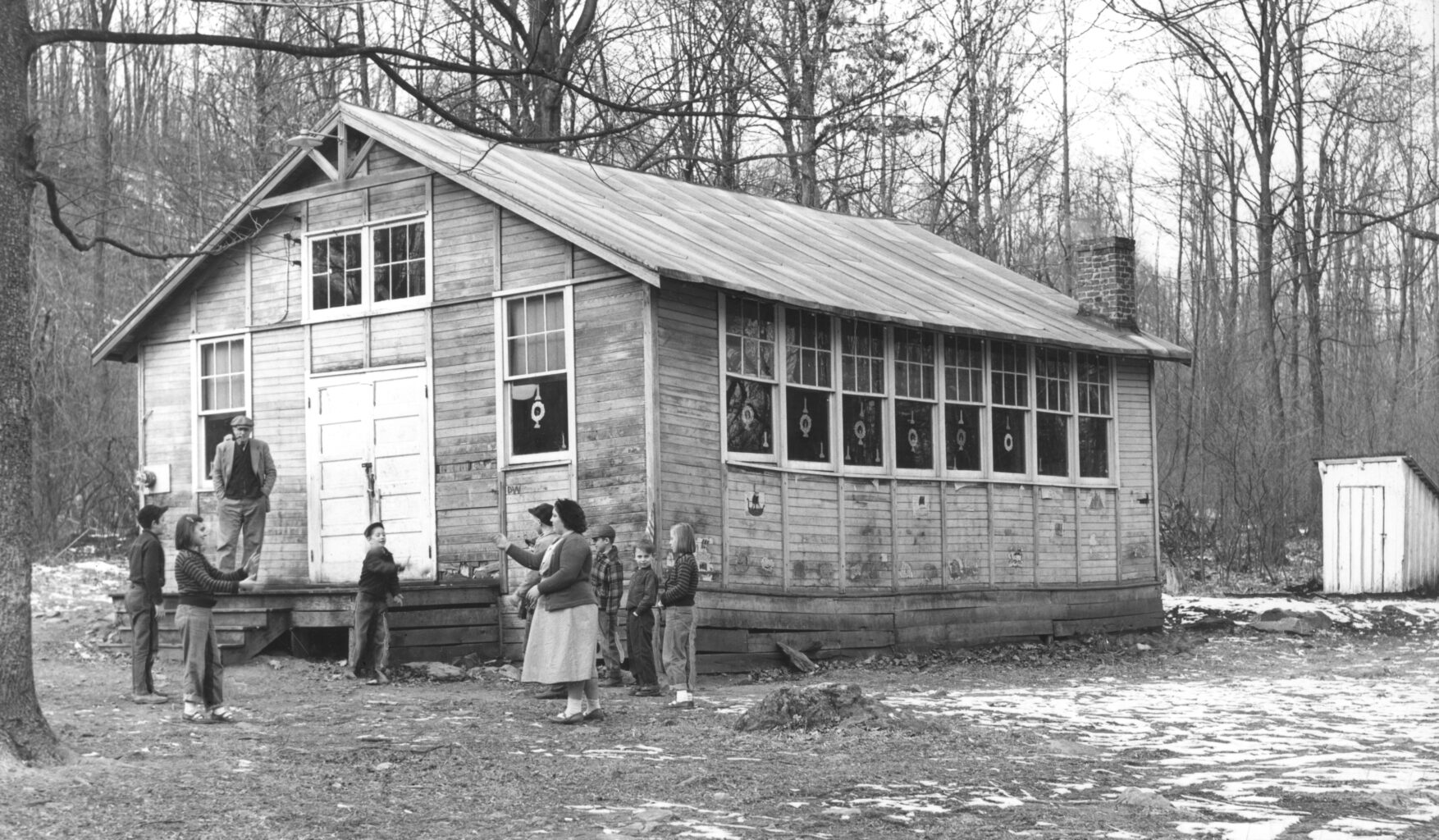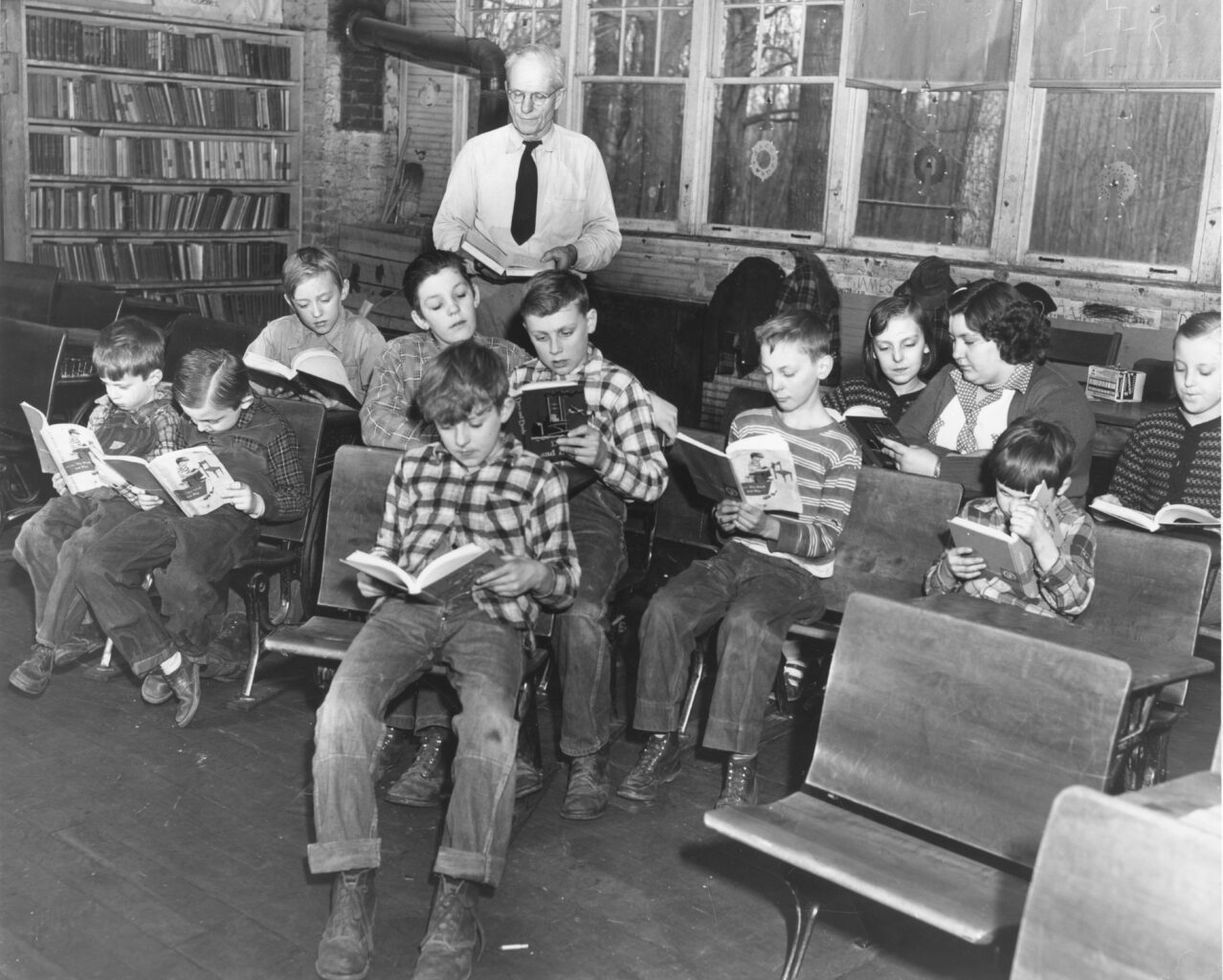 William McGill would have laughed at the idea that students need to be educated in $60-million-plus schools to get a good education. He would have known. For nearly a quarter century, he taught school in the last one-room school in Frederick County.
William McGill would have laughed at the idea that students need to be educated in $60-million-plus schools to get a good education. He would have known. For nearly a quarter century, he taught school in the last one-room school in Frederick County.
“Some people are of the opinion that youngsters can’t get an education in a one-room school. That isn’t keeping with the facts,” McGill told the Sun Magazine in 1952. “Since 1910, I’ve been teaching in schools like this, and I wish I had a dollar for every one of my pupils who went to the university. Why, last year Betty Ann Willard, a girl I taught, was the honor graduate at Thurmont High.”
Philip’s Delight
Philip’s Delight School was located off an old lumber trail surrounded by thick woods high up on Catoctin Mountain. Before the school closed on February 1, 1955, the families on the mountain had had their own school since 1800.
Albert Hauver, a 96-year-old resident on the mountain, told McGill the history of the school in 1943. The families living on the mountain in 1800 sought a location to build a school for their children.
It is said that Philip Fox found a locations and declared, “What a delightful spot for a building,” according to McGill. People started calling the spot Philip’s Delight and built a log cabin on the site that served as the school until 1886. That year, the building burned down. Another building was built a short distance away that served as the new school until 1932 when it also burned down. The final school building was brought into the area from Foxville and served until the school was closed. William Stump, writing for the Sun Magazine, said that the final building was “a dull, weather-beaten building, and the years have made it swaybacked, like and old plowhorse.”
Despite its exterior, the school was relatively well equipped. McGill told The Frederick News in 1943, “Many visitors drop in on us during the school year and they frequently manifest surprise at our modern equipment, such as cards, charts, wall maps, textbooks, test materials and library books. The superintendent and supervisors have made it their policy to furnish all school children in the county with as near equal opportunities as possible.”
During its 155 years, Philip’s Delight was always a one-room school with never more than few dozen students in grades one through seven. When the school finally closed, it only had 13 students.
William McGill
McGill was the last teacher at the school and it was because of his strong support of the school that it remained open as long as it did.
When the school burned down in 1932, McGill told The News, “The superintendent’s office said, ‘Ah! Now we can bring those pupils down the hill to Thurmont.’ So they announced that they were not going to rebuild, and they put on a new school bus. And you know what happened?
“It ran for four months, and it didn’t have a single passenger!”
The families who lived on the mountain didn’t want their children traveling on the narrow, winding road up and down the mountain twice a day. In the winter, the roads could quickly turn icy, which made them even more dangerous.
McGill volunteered to teach at the school, but after a few years was transferred to act as the principal at Foxville School. However, by 1946, the Philip’s Delight School had gone through a number of teachers; none of whom wanted to teach in such a small school and isolated area. The Frederick County Board of Education began discussing closing the school, which parents again resisted vehemently.
McGill gave up his principalship and moved once again to Philip’s Delight School where he taught until 1955.
McGill was the son of an Episcopal minister who was born near Catoctin Furnace. He attended Old St. Paul’s School in Baltimore and Thurmont High, but he did not attend college initially. Once he was a teacher, he did study summers at Johns Hopkins and Western Maryland College.
He began teaching in Frederick County’s small rural schools in 1910. He would teach as many as 84 students at a time, some of them 21 years old.
“Got arrested twice for fighting with my pupils, then. They were as old as 21 in those days, and didn’t have a whole lot of respect until I drilled it into them,” McGill told The News.
Despite his early fights, McGill became a teacher who was loved and respected by his students and parents.
“He was the last of the one-room school teachers in the county, and in his early days he taught in areas where there were no communications and some of the patrons could not read or write. In some cases, Mr. McGill was the main liaison with the outside world for medical services, letter writing, and the like,” The News reported.
In his later years, he was often called “Gentleman of the Old School.”
During the 1940’s McGill would bike from Catoctin Furnace seven miles up hill along narrow roads to reach the school. If it was snowing, he would walk the distance. By the 1950’s, McGill had added school bus driver (actually, it was a station wagon with “school bus” painted on the rear) to his duties, but this allowed him to be able to drive to school.
You might also enjoy these posts:
- LOOKING BACK 1959: Train crashes into Garrett County school bus killing seven children
- Small-town high school students prepare for the journey of a lifetime in the middle of the Great Depression (Part 1)
- Thurmont’s Seminary gave students an advanced education
One Reply to ““Gentleman of the Old School”: William McGill & Frederick County’s Last One-Room School (Part 1)”
Comments are closed.